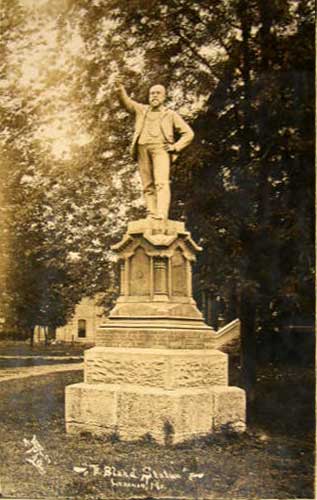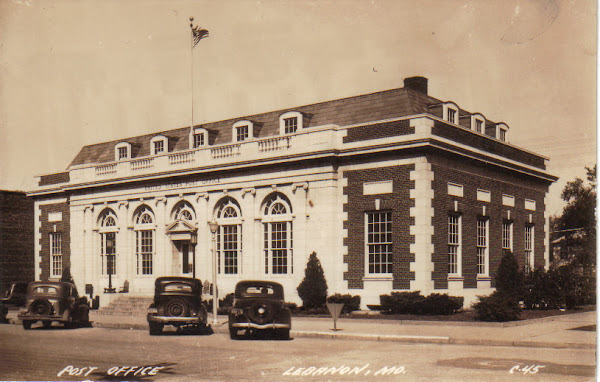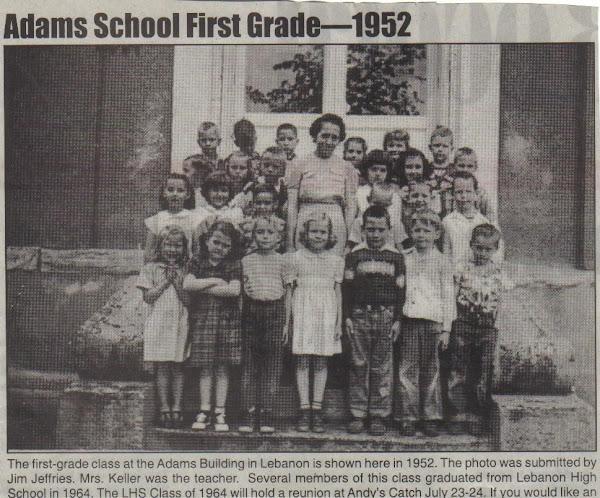Here is another great letter from today's Spfd paper. Don't know this person but she is quite a writer!
Dusk had barely settled before the first loud boom echoed across the shallow valley where I live, just a stone's throw from Wilson's Creek National Battlefield. Then, the barrage began. Fireworks season again.
As the trees darkened into stark silhouettes against an uneasy, overcast sky, the sounds of explosions surrounded my backyard. It wasn't too difficult to imagine myself back to the time on this very soil when artillery shells and bombs were meant to maim and kill fellow American citizens, warriors for both the North and the South. Back then, the blast of gunpowder exploding in cylinders resulted in more than high-fives and dares to see who among a crew of foolhardy middle-school boys would hold onto the lit roman candle the longest before tossing it (hopefully) skyward.
How many women in that distant time listened, as I did now, to the sounds of battle ricocheting off the hills surrounding their once quiet homesteads? I felt a sad kinship to this sisterhood, who surely wanted many of the same simple comforts women today strive for in our modern lifetimes: a secure place to raise our children, plentiful food, clean water, and most importantly, peace.
The complacent security we've known in brief restful spans as a young nation has once again slipped out of our grasp. Distant battlefields in foreign lands are remote no longer with the advent of live-action feeds from cell-phone cameras.
Somehow, the celebration inherent in lighting wicks on a bouquet of bottle rockets escapes me this year. Young men and women in uniform are risking their very heartbeats in a throat-parching desert far away from these green hills. They must awaken daily dreading an encounter with all too real eardrum-shattering artillery. Wouldn't it be great if, instead of incinerating a $20 bill in the form of fireworks, we all put together care packages for our neighbors serving overseas instead? After all is said and done, they're the ones preserving the very freedoms we celebrate on Independence Day.
Wednesday, July 4, 2007
Subscribe to:
Post Comments (Atom)
Current discussion on "Banishment during Civil War"
RE: [ourhistory] Banishment during the Civil War
Ann,
My gg-grandfather Ephraim Davis who was 33-36 at the time removed his family including my g-grandfather Alonzo (3 yrs old) and Harve (5 yrs old) to Illinois during the Civil War and returned afterwards. It is said he did this to protect his family, but on the return trip his wife and newly born daughter died and are buried near Rolla
I Googled ‘Banishment during the US Civil War” and found a couple of interesting notes on banishment
Note 1
Banishment to the South was a favored Yankee method of dealing with Southern sympathizers in their midst, though being a sympathizer did not necessarily mean being a spy. Many women were forced into exile under the threat of more severe punishment for offenses ranging from publicly denouncing an occupying army to actually giving information to the enemy. When Henrietta Barr's sister, Sarah Cotton, was arrested, Barr wrote in her diary:
"After 12 o'clock at night, Friday the 17th, Sarah was arrested and taken over the lines without a word of a trial. She was torn from her little children and threatened if she dared return that she would be `shot as a spy.' Comment is unnecessary."
Note 2
In response to widespread criticism of his suspension of the writ of habeas corpus and the banishment of Vallandigham, Lincoln wrote a long letter to Democratic Party leaders defending his actions. Lincoln declared that the regular civilian courts were inadequate during a rebellion. He claimed that those opposing the Unions cause endangered "the public safety." Ordinarily, he wrote, such people could not be arrested since criticizing the government was not a criminal offense. If such persons were arrested, they would undoubtedly be released on a writ of habeas corpus by a civilian court judge. The necessary solution, Lincoln argued, was to suspend the writ and lock up the troublemakers until the war ended.
As for Vallandigham, Lincoln charged that he was encouraging desertions from the Union army. "Must I shoot a simpleminded soldier boy who deserts," Lincoln asked, "while I must not touch a hair of a wily agitator who induces him to desert?"
After Vallandigham was banished to the South, his friends went to the U.S. Supreme Court in an attempt to convince the justices to hear the case. On February 15, 1864, the Supreme Court announced it would refuse to hear the case, saying that it had no authority to review the proceedings of a martial law court. While the bloody Civil War raged on, the Supreme Court decided it was not the time to challenge the power of General Burnside or his commander-in-chief, Abraham Lincoln.
Note 3
Rowland Family, Papers, 1844-1893, (C2244)1 folder(s)Includes letters from Robert A. Rowland to his wife Olive in Howard County, MO, while he was enroute (1849) and in California (1850) and during his imprisonment and banishment to Illinois during the Civil War. Also includes miscellaneous letters from other family members and newspaper article describing death of and memorial services for I.N. Rowland (1893).
Bill Henry
Ann,
My gg-grandfather Ephraim Davis who was 33-36 at the time removed his family including my g-grandfather Alonzo (3 yrs old) and Harve (5 yrs old) to Illinois during the Civil War and returned afterwards. It is said he did this to protect his family, but on the return trip his wife and newly born daughter died and are buried near Rolla
I Googled ‘Banishment during the US Civil War” and found a couple of interesting notes on banishment
Note 1
Banishment to the South was a favored Yankee method of dealing with Southern sympathizers in their midst, though being a sympathizer did not necessarily mean being a spy. Many women were forced into exile under the threat of more severe punishment for offenses ranging from publicly denouncing an occupying army to actually giving information to the enemy. When Henrietta Barr's sister, Sarah Cotton, was arrested, Barr wrote in her diary:
"After 12 o'clock at night, Friday the 17th, Sarah was arrested and taken over the lines without a word of a trial. She was torn from her little children and threatened if she dared return that she would be `shot as a spy.' Comment is unnecessary."
Note 2
In response to widespread criticism of his suspension of the writ of habeas corpus and the banishment of Vallandigham, Lincoln wrote a long letter to Democratic Party leaders defending his actions. Lincoln declared that the regular civilian courts were inadequate during a rebellion. He claimed that those opposing the Unions cause endangered "the public safety." Ordinarily, he wrote, such people could not be arrested since criticizing the government was not a criminal offense. If such persons were arrested, they would undoubtedly be released on a writ of habeas corpus by a civilian court judge. The necessary solution, Lincoln argued, was to suspend the writ and lock up the troublemakers until the war ended.
As for Vallandigham, Lincoln charged that he was encouraging desertions from the Union army. "Must I shoot a simpleminded soldier boy who deserts," Lincoln asked, "while I must not touch a hair of a wily agitator who induces him to desert?"
After Vallandigham was banished to the South, his friends went to the U.S. Supreme Court in an attempt to convince the justices to hear the case. On February 15, 1864, the Supreme Court announced it would refuse to hear the case, saying that it had no authority to review the proceedings of a martial law court. While the bloody Civil War raged on, the Supreme Court decided it was not the time to challenge the power of General Burnside or his commander-in-chief, Abraham Lincoln.
Note 3
Rowland Family, Papers, 1844-1893, (C2244)1 folder(s)Includes letters from Robert A. Rowland to his wife Olive in Howard County, MO, while he was enroute (1849) and in California (1850) and during his imprisonment and banishment to Illinois during the Civil War. Also includes miscellaneous letters from other family members and newspaper article describing death of and memorial services for I.N. Rowland (1893).
Bill Henry
Bennett Spring Hotel








.jpg)











.jpg)


No comments:
Post a Comment